 |
Eliminate lump-sum tax to create a healthy competitive environment among economic sectors. (Photo: QUYNH TRANG) |
Strengthening propaganda work when changing tax management policies for business households
Reporter: Sir, Decree No. 70/2025/ND-CP of the Government amends and supplements a number of regulations on invoices and documents, including regulations on the implementation of electronic invoices generated from cash registers for business households . What solutions has the Tax Department had to effectively implement these policies?
Mr. Mai Son , Deputy Director of the Tax Department: According to the provisions of Decree No. 70/2025/ND-CP, from June 1, 2025, households and individuals doing business paying fixed tax with revenue of 1 billion VND/year or more, selling goods and providing services directly to consumers, will be required to use electronic invoices generated from cash registers with electronic data transferred to the tax authority. To implement this, the Tax Department has had many synchronous solutions to support households and individuals doing business in registering and using electronic invoices generated from cash registers, specifically:
Firstly, coordinate with e-invoice software solution providers to introduce free software policies, reduce e-invoicing costs for businesses, especially households and individual businesses, to effectively and practically implement, providing maximum support for private economic development according to the policies of the Party, National Assembly , and Government.
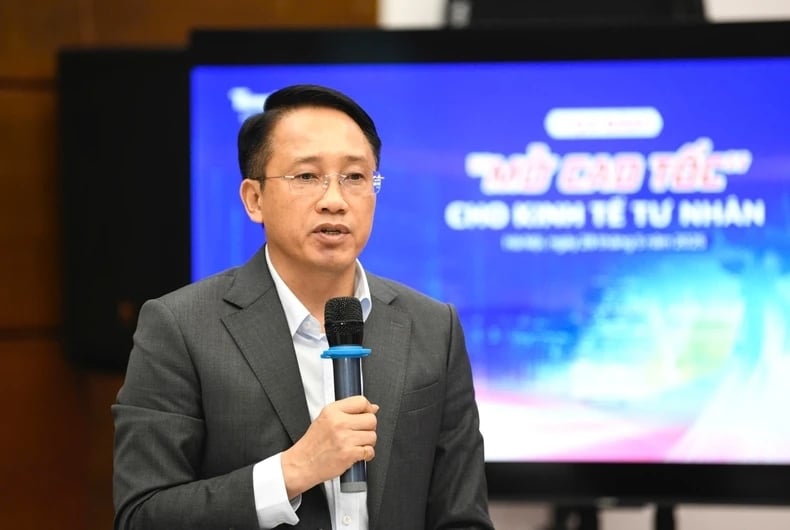 |
Mr. Mai Son, Deputy Director of Tax Department |
Second, direct tax authorities at all levels to proactively coordinate with local state agencies to review the list of business establishments subject to the application; seek direction from the People's Committees of provinces and cities to promote implementation. Tax authorities at all levels coordinate and work with e-invoice solution providers and tax agents to organize training conferences on legal policies; organize working groups to visit the business locations of each business household in the area to disseminate, propagate, and mobilize people to implement regulations on the use of e-invoices generated from cash registers, as well as provide instructions on the registration and use of e-invoices generated from cash registers.
Third, focus on modernizing and digitizing the tax sector, deploying digital platforms, and applying eTax Mobile electronic tax to serve taxpayers. In the coming time, the tax sector will continue to innovate, create, and upgrade electronic tax application products to best serve the tax declaration and payment of taxpayers, especially business households and individuals.
In addition, with the spirit of learning, listening, and taking taxpayers as the center of service, in the near future, the Tax Department will organize an online conference to invite business households and individuals to discuss and share, listen to the difficulties, problems, and concerns that business households are facing, thereby helping tax authorities and business households successfully implement the use of electronic invoices generated from cash registers in accordance with the law.
Reporter: What is the significance of the transition from lump-sum tax to tax declaration, and moving towards the elimination of lump-sum tax, for tax management in particular and the development of private enterprises in general, sir?
Mr. Mai Son , Deputy Director of the Tax Department: The conversion from lump-sum tax to tax declaration is an important turning point in tax management as well as in promoting the development of the private economic sector.
For tax administration, eliminating the lump-sum tax is a necessary step to improve transparency and fairness in tax administration. When business households self-declare and pay taxes based on actual revenue, tax obligations will accurately reflect their capacity and business performance. This is consistent with the modern tax administration principle of “ Taxpayers self-declare, self-pay, and self-responsibility ”, and is also the basis for accurately reflecting reality to create a more transparent and equal business environment among economic sectors.
 |
A business household at Dong Xuan market, Hanoi city |
In addition, the transition to a declaration form will contribute to promoting modernization and improving the efficiency of tax management. When business households declare via digital platforms, tax authorities can provide more convenient support services, while enhancing the ability to prevent fraud and budget loss. Tax authorities will also have more accurate data for effective management, supervision and support. In this form, tax management is implemented based on data, electronic and transparent, which is the foundation for building a modern, effective tax system, in line with the goals of sustainable development and deep integration.
In addition, the elimination of lump-sum tax creates a foundation for the development and transformation of the private economic sector, especially bringing many practical benefits to business households in terms of development opportunities, enjoying support policies from the State and creating a fair business environment. The elimination of lump-sum tax helps business households to make their books and invoices transparent, improve their ability to demonstrate their finances, thereby easily accessing capital and support policies from the State, creating a foundation for business development. Accordingly, during the transformation process, business households are also supported to participate in the digital economy through accounting software and shared electronic platforms, helping to effectively manage and modernize business operations.
At the same time, through the declaration method, all business entities are managed fairly, determining tax obligations commensurate with their scale and income, accurately reflecting the business capacity of each household, thereby creating a healthier and fairer competitive environment.
Many solutions to support taxpayers
Reporter: The household business sector accounts for a very large proportion of the economy and is the reserve force for the development of Vietnamese enterprises, but is facing many difficulties in terms of management capacity, capital, market, etc. What support policies does the tax authority have for household businesses so that tax management can be highly effective in this turning point of transformation?
Mr. Mai Son , Deputy Director of the Tax Department: To provide maximum support to business households during the conversion process, the Tax sector is currently implementing and will implement groups of tasks, specifically:
Research and propose amendments and supplements to relevant legal regulations on tax and tax management. Specifically, in the draft Law on Tax Management (replacement), it is proposed to end the lump-sum tax collection mechanism for business households and individuals, and switch to applying the self-declaration and self-payment mechanism. At the same time, research and amend the Law on Personal Income Tax and regulations related to value added tax to adjust the threshold of annual revenue not subject to tax. This adjustment is to ensure a reduction in the tax burden for business households with low revenue (below a certain threshold).
Focus on reviewing and simplifying the accounting books, invoices and documents to the maximum extent so that businesses can easily access and apply them; coordinate with suppliers to provide free shared accounting tools and software, support equipment and costs for electronic invoice services in the initial phase. Increase support and guidance on accounting, taxes and laws for businesses, helping businesses get used to keeping track of books and issuing transparent invoices without incurring additional complicated procedures or compliance costs for taxpayers.
 |
Business households will be supported to effectively convert to tax declaration form. |
Continue to promote tax administrative procedure reform, simplify processes, build application systems that allow automatic determination of tax obligations based on electronic invoice data, automatically calculate tax amounts and prepare tax declarations, taxpayers only need to check and confirm. At the same time, continue to coordinate with relevant ministries and branches, continue to promote data connection with business registration agencies to simplify conversion procedures, shorten business registration and tax registration processes.
Focus resources to provide maximum support to business households before and after conversion. Implement direct and online consulting and guidance programs to help business households understand accounting, invoice and tax obligations when converting. After the business household completes the conversion, the tax authority continues to maintain a regular support contact, accompanying the new enterprise in the process of stabilizing and developing production and business.
With such companionship and support, the Tax Department believes that business households will feel more secure when converting, both complying with new regulations and continuing to develop business activities.
Reporter: To prepare for the abolition of lump-sum tax, how is the tax authority implementing the work?
Mr. Mai Son , Deputy Director of the Tax Department: In addition to perfecting the legal framework on tax policy and tax management, proposing amendments and supplements to relevant Tax Laws and Tax Management; the Tax Department is implementing a new tax management model whose core task is to streamline the organization, making it efficient, effective and efficient; in which reforming the tax management apparatus for business households is one of the top priorities.
Along with that, promote reform of tax administrative procedures, simplify the process of declaring and paying taxes for business households and individuals. Build application systems that allow automatic determination of tax obligations based on electronic invoice data used by business households.
Regarding the work of supporting business households in the transition period, realizing the initial confusion of business households when switching from the lump-sum tax method to the declaration method from January 1, 2026, the Tax sector has implemented many specific support measures.
The Tax sector is and will continue to promote internal digital transformation, improve the quality of public services and tax management capacity. The Tax Department strengthens connection, integration and data sharing with relevant ministries, branches and units (in accordance with the provisions of the Law on Tax Administration and Project 06 of the Government on developing population data and electronic identification). Data interconnection allows the tax authority to closely monitor the activities of business households after the abolition of lump-sum tax; promptly detect and identify cases with tax risks or violations of the law.
Reporter: Thank you very much!
Source: https://baobinhphuoc.com.vn/news/4/173468/tin-nhan-hoi-thuc-ong-ntt-goi-vao-tong-dai-19004328-mot-cach-mo-am








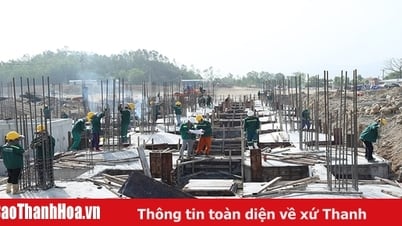
























































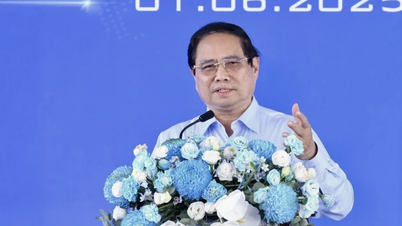

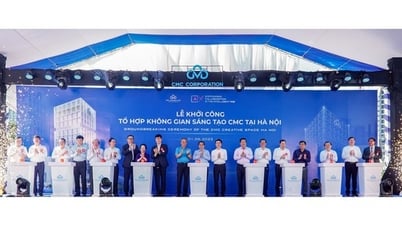

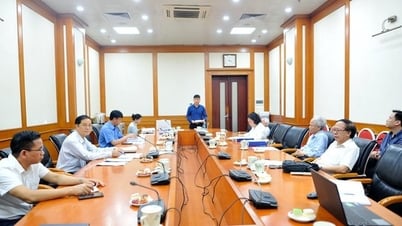



























Comment (0)